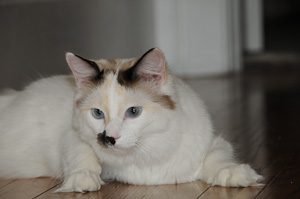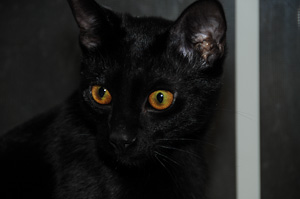|
Feline Vaccination Against Preventable Diseases
Vaccination is the key to your pet's overall health. Unless properly vaccinated, your pet is at risk of contracting and spreading one of several, possibly fatal, infectious diseases. Most common infectious diseases  can be prevented by routine vaccination. Kittens should begin their vaccination series at 6-8 weeks of age and these vaccines should be boostered every 3-4 weeks until at least 14 weeks of age, when adult immunity takes over. Depending on the vaccine, your pet should then be boostered annually or every 3 years in the case of rabies. We routinely vaccinate cats for feline viral rhinotracheitis, calicivirus, panleukopenia and chlamydia which is a 4 way vaccine (FVRCP) as well as feline leukemia virus (FeLV) annually. can be prevented by routine vaccination. Kittens should begin their vaccination series at 6-8 weeks of age and these vaccines should be boostered every 3-4 weeks until at least 14 weeks of age, when adult immunity takes over. Depending on the vaccine, your pet should then be boostered annually or every 3 years in the case of rabies. We routinely vaccinate cats for feline viral rhinotracheitis, calicivirus, panleukopenia and chlamydia which is a 4 way vaccine (FVRCP) as well as feline leukemia virus (FeLV) annually.
Rabies vaccination is required by law for dogs and cats and may be administered as a 1 year or 3 year vaccine. Initial rabies vaccination must be a 1 year only vaccine.
Feline Leukemia (FeLV) and Feline Immunodeficiancy (FIV)
Feline leukemia virus (FeLV) and Feline immunodeficiency virus (FIV): FeLV and FIV are among the most common contagious infectious diseases of cats. Both of these viruses can weaken the immune system of cats causing a  variety of symptoms and clinical signs that can ultimately result in death. There is no cure for cats who harbor these viruses. Occasionally these viruses (especially FIV) can be carried for years without causing disease. These viruses are spread from cat to cat through close contact or exposure to discharges from the eyes, nose, urine or the milk of nursing moms. Bite wounds can also transmit the virus. A simple in-house blood test is needed to test for both of these viruses if their status is unknown. We recommend making sure kittens are at least 8 weeks of age to get an accurate result. We recommend testing all cats and kittens with unknown FeLV/FIV status. variety of symptoms and clinical signs that can ultimately result in death. There is no cure for cats who harbor these viruses. Occasionally these viruses (especially FIV) can be carried for years without causing disease. These viruses are spread from cat to cat through close contact or exposure to discharges from the eyes, nose, urine or the milk of nursing moms. Bite wounds can also transmit the virus. A simple in-house blood test is needed to test for both of these viruses if their status is unknown. We recommend making sure kittens are at least 8 weeks of age to get an accurate result. We recommend testing all cats and kittens with unknown FeLV/FIV status.

| 
